Welcome today’s guest, S.M. Henley, a fantastic author for those that enjoy the darker side of things.
Sue was brought up in an English seaside town singing to Echo and the Bunnymen and worshiping Siouxsie Sioux. She now lives in rural Alberta, Canada, with more pets than people. Where everyone is friendly, winters are long, cheese is bright orange, and the occasional moose wanders through her yard.
Sue’s books stand as testament to the Gothic overtones of English suburbia, the world just beyond the veil, and the humor of Rick Mayall.
The Urban Fantasy is darker than average. It’s gritty, character driven stuff, fast action plots notwithstanding. It dips a toe into Dystopia, splashes blood freely, and features various creatures from the supernatural world as well as some pretty cool humans.
Her Horror is darker. Paranormal elements intertwine with psychologically driven plots. Characters run from flawed to freaky. Settings are realistic. Atmospheres are claustrophobic. Blood is optional.
Interview
- Tell us something about how you write? i.e. are you a plotter or a pantser? Do you have any weird or necessary writing habits or rituals?
I’m a plotter in as much as I have an outline that I mostly stick to, but I do a shed-load of idea doodling beforehand which range from some scribbles, lists, and whole first drafts of scenes. I usually have the first and last scene drafted before I put the outline together. In terms of structure I tend to use a hybrid of the roller coaster beat structure for my UF. It has the fast-pacing I like. I’ve created a template which is basically a table with each plot element on the left, then space on the right for me to start adding the key moments or plot points for a particular story. Once I have the key moments written down, I add short bullet-pointed scenes. When those are all done, I switch to Scrivener, transfer each scene to a cork board card and flesh out the bullet points to create a paragraph of detail. Then I arrange those into chapters, ensure I’m still hitting all the plot points and beats, then I’m good to go. I always write serially unless I really get stuck, then I may switch to an easier scene just to get the writing gods on my side again. I’ve just finished plotting the whole of a 5 book series in this way. No rituals. Beverage of choice is coffee. I write in the morning, and not every day or to a quota. I find I need to give my creative brain a rest for up to a few weeks at a time or my writing style falls flat. When not writing, I’ll do some editing, work on some new plots, do some research, or even some marketing!
2. What gives you inspiration for your book?
I’m one of those very lucky people who finds inspiration everywhere. In fact, sometimes I’m so inundated with ideas that it can be challenging for me to to sift through them to pursue the best ones. I will literally have the first lines of stories – or even complete opening scenes – spontaneously pop into my head. If I watch a TV show, read a news report, or read about a person from history, a whole storyline gets triggered. For the Written by Birds novels I was inspired by stories about the real-life darker side of Turin, Italy, that I heard about years back on a TV show. I filed it away ready for an opportunity to get creative. I combined that with an unrelated historical account of a monk killing his Abbot in Southern England in the middle ages. Those two things, effectively gave birth to the first book, Scratching in the Dirt. I also find a UK periodical The Fortean Times a font of inspiration – it documents real accounts of the weird and wonderful. I can’t get through one of those magazines without a zillion story-lines jumping out at me! I have an upcoming full-length novel which was inspired by one 50 word report from that magazine. Another technique I use is to use a deck of Tarot cards to help me get some inspiration for settings, characters, and especially dialogue. Has nothing to do with their traditional purpose, I just find them great as a jumping off point if nothing else is working. [Jamie’s note: I love the tarot card idea.]
3.Of all the characters you have created, which is your favorite and why?
I have a soft spot for Billy Nadig. He is introduced in Book 1 but in Book 2, Taking to the Sky, he really comes into his own. Each book in the trilogy is written with a mixed point of view, but there is always one main character focus, and in Taking, that is Billy. He’s introduced as a technomancer, someone who has mastered the art of combining technology with magic, so he combines computer code with natural magic to control, influence, or just watch events that are happening elsewhere. He uses gadgets like cellphones and computers (“if it has a computer chip, it’s Billy’s”), electricity and radio waves, etc. But it’s not his skills that endear him to me, it’s his arc. None of the main characters are straight up good or bad, but with Billy we see a complete transformation. Without spoilers, he literally transforms into a non-human, but it’s more how he grows as a character that I find fascinating. He transitions from a neglected and dirt-poor immigrant to rent boy, from East London lad to playboy millionaire, from best friend to hero, and finally lover. I think I’m so fond of him because of all the characters in the Written by Birds trilogy, his story developed totally spontaneously, I just wrote it down. Billy is also funny, has serious problems with not blurting out inappropriate sexual innuendo, and a soft side that makes you just want to give him a hug. I loved writing his buddy scenes with the soul of the necromancer, Joshua, and the Swedish mercenary, Soren Huxford. I think Billy and Soren together are hilarious. A beta reader summed it up by telling me she hated Billy in Book 1 – she thought he was a chav (British slang for “antisocial youth” but the Urban Dictionary will give you a much better definition lol) – then gradually he grew on her, until finally she was rooting for him. And even though I don’t write romance, he was the only character I really wanted to experience true love.
4. What else would you like readers to know about you or your work?
As Urban Fantasy becomes a more diverse genre, I think it’s important for authors to clearly communicate their style. It can be tricky for the reader to choose something they will enjoy as most books tend to skew towards either romantic paranormal or gritty realism. I tend to write the latter – old-style UF. There may be the odd romantic subplot, but it’s never PNR; and though sexual themes emerge quite often, any actually action generally takes place off-page if at all. I like to include those elements that first marked the genre I fell in love with: gritty realistic themes; violence that sometimes (usually) ends in blood; a contemporary urban setting mixed with a supernatural world; some proper scary monsters which may at times even inch over into Horror territory. My stories also contain a good bit of mystery and a substantial kick of adventure. Above all, I want darker themes bubbling under the surface. I also write a variety of diverse characters who tend to have personalities that incorporate multiple shades of grey, from the supernaturals to the humans. We all have a lightside and a shadowside, and that’s something I like to explore (takes me back to my Tarot days). In my books, sometimes the demons are the heroes, the humans do really bad things, and the angels aren’t altogether pure of heart. All that aside, I also throw in some humour to break up the darker themes. If you like the tone of the darker episodes of Supernatural, BTVS, and Angel, you’re in the right ball park. Not the ones that made you cry, but the ones that made you slightly uncomfortable or even not want to close your eyes at bedtime.
5. Do you have a day job in addition to being a writer? If so, what do you do during the day?
I’ve had a variety of different jobs. I was trained as a business analyst and did that professionally for years in the UK. I then opened my first small business as a Tarot reader and teacher of psychic development. It’s an interest I’ve had since a teen, and something I still do on occasion. Most recently, though, I owned my own pet services business, looking after everything from cats to alpacas. I closed that last year, and I’m now working for a not-for-profit supporting small business entrepreneurs, while I write around that work. I find my current work extremely rewarding. At the moment we have a program which supports high-school entrepreneurs run their own businesses over the summer. I am continually amazed by the talent in our young people and get so mad listening to the constant disrespect targeted at the millennial demographic. These guys are focused, determined, and making their mark on the world. I get very passionate this program!
6. Tell us a little about your plans for the future. Do you have any other books in the works?
Now that the first trilogy is complete, I’ve started work on my next series called Skye Quest. It is set in the same world as Written by Birds, i. e. in a contemporary urban fantasy world that has just averted the demon apocalypse. There is the same mix of gritty realistic scenarios, that just happen to have vampires, shifters, demons, and angels – as well as the odd human thrown in for good measure. These 5 novels are all set in Vegas and have one main character, a supernatural escort called Sowilo Skye. She is on a quest to free her daughter who is trapped in the Otherworld. Of course, “stuff” keeps getting in her way, like the spirit of a dead playboy, a human TV ghost hunter who’s inadvertently raised a demon during a video shoot, and a zombie go-go dancer. She’s also got a dead husband trapped in a mirror, and the main big bad is a seriously horrible demon who delights in throwing her off her game, usually with dire consequences. I’m really looking forward to this series. There is more mythology in this one, as some of the storylines are based on the legends of the mourama and the enchanted mouras of Galician folktales. The first of this series will be out by the end of this summer and is called Sowilo Skye and the Dead Playboy. I also have my first psychological horror coming out soon. The novel is called Weary and is set in the middle of a backwoods town in northern Alberta. It’s a disturbing but accessible paranormal thriller. I don’t think I’ll ever be able to write without at least a little bit of the supernatural.
7. If you could be transported to any fictional world, which would it be? Why?
It has to be the world of Buffy the Vampire Slayer. I’d probably hang out with Xander a lot and take secret pictures of Spike to sell on the internet for oodles of cash. I’d also reveal Caleb’s eye-removing plans to him ahead of time, so we could figure out a defense. Poor Xander, now that was dark scene. I’d also insist on singing in Once More With Feeling, so that even Sarah Michelle Gellar would sound good when compared to my caterwauling. It would be great fun!
8. You’re in a tavern, and a dwarf challenges you to a duel. What do you do? What you do the same thing if the challenger were an ogre? Why or why not?
I would whip out my cards and read his fortune. Of course, the fortune would be good, and it would only come into effect if he spared my life. With the ogre, I’d give him a teddy bear; they may be big and tough, but inside they have soft-gooey centres. [Jamie’s note: LOL! This is a great solution that I never would have thought of.]
Where can we find you online?
Blog: https://smhenley.com/blog/
Website: https://smhenley.com/
Facebook: https://www.facebook.com/smhauthor/
Twitter: https://twitter.com/SM_Henley
Amazon Author Page: https://www.amazon.com/S.M.-Henley/e/B06XH15DLM/
My books are available at all ebook retailers. To find out more go to: https://smhenley.com/books/written-by-birds/
Taking to the Sky
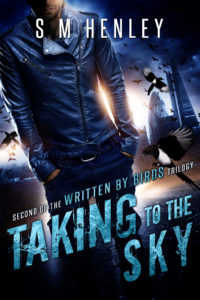 Billy’s life is just sex, tech, and magic. So how will he cope when things get serious? End-of-the-world serious.
Billy’s life is just sex, tech, and magic. So how will he cope when things get serious? End-of-the-world serious.
For rich technomancer Billy Nadig, life’s a game: he lives in a cool East London penthouse, has a bedroom stocked with blond-haired lovelies, and an unhealthy obsession with women’s shoes. But when Billy is told he’s a Sleeper, awoken by Heaven to stop his best friend—a half-vampire girl—make a decision which could destroy the world, even he realizes its time to get serious.
Billy’s agonizing transformation couldn’t come at a worse time: demons are rising, evil angels take center stage, and a blond-haired mercenary continues to dog his every step. Saving the Earth will take both hard fighting and hard choices, maybe even the ultimate sacrifice—to kill his best friend. But if she dies, who will save Billy?
Taking to the Sky is the second in the Written by Birds trilogy and is an adult urban fantasy novel set on the streets of modern-day London, Las Vegas, and Boston. It treads lightly in the darkness, with not a small amount of blood and gritty humor. Just ask the birds…
Excerpt
Billy was still sitting there when he noticed the young man loitering by the garbage bin just off to his right. Actually, more like fourteen or fifteen, he seemed to be looking for discarded food, and had found some sort of Chinese concoction in a takeout box. He was peering at it cautiously as though expecting something to jump out at him. Sensible thinking, bruv.
The boy didn’t seem to find what he was looking for and dumped the carton back in the garbage before reaching down further, up to his armpit in discarded newspapers, food wrappers, used tissues, and condoms (Billy assumed).
This time, the boy seemed to come up trumps. He grinned and pulled out—a rat. A full grown brown rat which was very much alive and wiggling, dangling by his tail from the tips of the boy’s fingers.
Billy lurched backward, even from his safe distance away. He didn’t have any particular phobias, but rodents generally were a sticking point, and rats especially.
He continued to watch in fascination.
The boy held the rat above his head and looked deep into its eyes. The animal twisted its whole body away from the gaze as far as it could, bucking almost perpendicular to the fingers that held it tight, a position its little body could not maintain for long before gravity pulled it down.
As the rat fell back, the boy opened his mouth and bit its head right off.
Billy’s own mouth dropped open. He stared in silent but fascinated horror as the boy threw the still twitching remains into the garbage bin and picked the severed head back out of his mouth. He examined it closely, stuck in a dirty finger to gouge out what remained of the neck, and sucked enthusiastically through the hole he had made. Even at the distance, it sounded to Billy like chunky soup being sucked through a wide straw, stuck pieces suddenly releasing with a satisfying slurp.
“Bloody hell!” Billy couldn’t help himself.
The boy looked up at him and shrugged, then added the remains of the rat’s head, now just empty bone housed in a furry brown skin bag, to the discarded body in the garbage and shuffled over.
Billy instinctively moved back around to the driver’s door of the Jeep, not wanting to get too close to this rat-eating teen.
“Whatchadoin?” the boy asked.
“Errm, nothing much.” Self-preservation made Billy feel he should be noncommittal, but he couldn’t stop himself adding, “Nice supper?”
“Eh! I like ‘em younger. Not so tough.” He was still chewing. Okay then!
“You gonna finish that coffee?” the boy asked.
“Probably not now, no.” Billy was feeling decidedly queasy and held it out. “Do you want it?”
“Yeah. Thanks.” He took the remains of the proffered coffee, smelled it, and sipped at it cautiously, as though it might be quite distasteful. Oh, the irony.
It met with his approval and he nodded a little. “Later.” He briefly flashed deep red eyes in Billy’s direction, then turned and wandered back down onto the beach, kicking sand and picking at his teeth with his black-filled fingernails.
Jamie’s Note:
After reading the above, I was intrigued and went straight to Amazon to get the first book in the series. This is the first time this has happened since I started publishing these interviews. If you find S. M. Henley as fascinating as I did, you will be pleased to learn that Scratching in the Dirt is free. You can get it here:
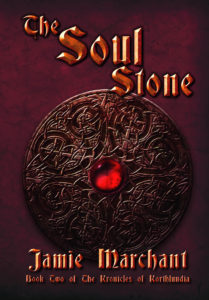 But since The Soul Stone was a sequel, I believe that no publisher would want it. Despite my distaste at the time for self-published works, I thought self-publishing would be my only choice. My husband was adamantly against doing so. To stop him begging me more than anything else, I submitted it to a few small presses (ones that didn’t ask for a synopsis) and was quickly accepted by two of them. It seemed that publishers would take a sequel. However, the presses that had accepted it did not look any better than Reliquary, so I turned them down and did more research into small presses, hoping to find one that better supported their authors. I came up with a list of publishers I thought would be good, queried again, and was accepted by Black Rose Writing. In addition to a cooler name, Black Rose had a much larger staff than Reliquary, including a publicist. My husband was again leering of the contract because it did not spell out in any specific detail what they would do to market it. I ignored him and signed.
But since The Soul Stone was a sequel, I believe that no publisher would want it. Despite my distaste at the time for self-published works, I thought self-publishing would be my only choice. My husband was adamantly against doing so. To stop him begging me more than anything else, I submitted it to a few small presses (ones that didn’t ask for a synopsis) and was quickly accepted by two of them. It seemed that publishers would take a sequel. However, the presses that had accepted it did not look any better than Reliquary, so I turned them down and did more research into small presses, hoping to find one that better supported their authors. I came up with a list of publishers I thought would be good, queried again, and was accepted by Black Rose Writing. In addition to a cooler name, Black Rose had a much larger staff than Reliquary, including a publicist. My husband was again leering of the contract because it did not spell out in any specific detail what they would do to market it. I ignored him and signed.
 Billy’s life is just sex, tech, and magic. So how will he cope when things get serious? End-of-the-world serious.
Billy’s life is just sex, tech, and magic. So how will he cope when things get serious? End-of-the-world serious. Warily, The Ghost followed Zotico down the corridor to the high priest’s office. It was large, the walls covered with instruments of war—swords, shields, battle axes, and plaques ornamented with what looked suspiciously like human ears. The ears were new. Zotico caught The Ghost looking at them and swept his hand over a plaque that contained five ears nailed side by side. “Do you like the new decor? Sacrifices, all of them. I had them moved from our private sanctuary so I could better remember the devotion demanded by the god I serve.”
Warily, The Ghost followed Zotico down the corridor to the high priest’s office. It was large, the walls covered with instruments of war—swords, shields, battle axes, and plaques ornamented with what looked suspiciously like human ears. The ears were new. Zotico caught The Ghost looking at them and swept his hand over a plaque that contained five ears nailed side by side. “Do you like the new decor? Sacrifices, all of them. I had them moved from our private sanctuary so I could better remember the devotion demanded by the god I serve.” She had to be insane to trust her life to a hired killer. Frigg protect me! No, not Frigg. I’ve prayed to her time and time again, and the goddess has never helped me. But if I can’t rely on her, what can I do? She looked at the dagger she was still holding, then glanced at the sword Sigurd wore. The goddess had allowed her to be used by savages for two years, but Brigitta herself had used Sigurd’s sword to kill her master. Since the goddess couldn’t, or wouldn’t protect her, she needed to learn to protect herself. She tightened her grip on the dagger and held it up. “Will you teach me how to use this?”
She had to be insane to trust her life to a hired killer. Frigg protect me! No, not Frigg. I’ve prayed to her time and time again, and the goddess has never helped me. But if I can’t rely on her, what can I do? She looked at the dagger she was still holding, then glanced at the sword Sigurd wore. The goddess had allowed her to be used by savages for two years, but Brigitta herself had used Sigurd’s sword to kill her master. Since the goddess couldn’t, or wouldn’t protect her, she needed to learn to protect herself. She tightened her grip on the dagger and held it up. “Will you teach me how to use this?”







 My guest today is science fiction/fantasy author, Juliana Spink Mills, here to tell you about her exciting novel.
My guest today is science fiction/fantasy author, Juliana Spink Mills, here to tell you about her exciting novel.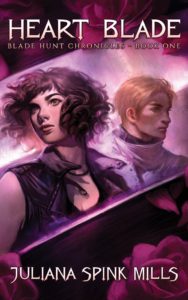 Teenage half-demon Del Raven wears a promise in scarred letters upon her skin. Now, pressured to make her first kill and seal her demon nature forever, she flees her pack and forges a dangerous partnership with young angel-blood Ash.
Teenage half-demon Del Raven wears a promise in scarred letters upon her skin. Now, pressured to make her first kill and seal her demon nature forever, she flees her pack and forges a dangerous partnership with young angel-blood Ash.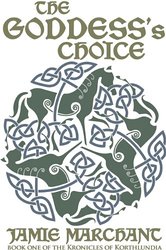 As I said in my previous post, The Goddess’s Choice, my first novel was published by Reliquary Press in April of 2012, and it was not selling. In October of 2012, Auburn University’s English Department (for which I work) sponsored its first writers conference, and I attended. One of the sessions was on marketing. This session gave me some ideas about what I might do to market my own book.
As I said in my previous post, The Goddess’s Choice, my first novel was published by Reliquary Press in April of 2012, and it was not selling. In October of 2012, Auburn University’s English Department (for which I work) sponsored its first writers conference, and I attended. One of the sessions was on marketing. This session gave me some ideas about what I might do to market my own book.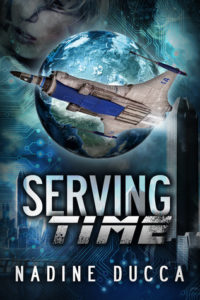 Another thing common in Goodreads groups is authors offered to trade reviews, meaning you read and review their book, and they do the same for you. I entered into quite a few such agreements, and I absolutely recommend against doing so. Most of those making these arrangements were self-published authors. (I hadn’t even heard the term “Indie” at that time.) I developed a prejudice against self-publishing that has taken me some time to get over. The vast majority of these books had no business being on the market. To begin with, they were riddled with errors. As an English professor, I may be more critical of punctuation and grammatical mistakes than most, but some of them were so bad they were unreadable. And punctuation was just the beginning of the problems with these books. Overall, they were amateurish. While doing this review swap, I read only one novel that I considered good, Serving Time by Nadine Ducca. You can read my review of it on
Another thing common in Goodreads groups is authors offered to trade reviews, meaning you read and review their book, and they do the same for you. I entered into quite a few such agreements, and I absolutely recommend against doing so. Most of those making these arrangements were self-published authors. (I hadn’t even heard the term “Indie” at that time.) I developed a prejudice against self-publishing that has taken me some time to get over. The vast majority of these books had no business being on the market. To begin with, they were riddled with errors. As an English professor, I may be more critical of punctuation and grammatical mistakes than most, but some of them were so bad they were unreadable. And punctuation was just the beginning of the problems with these books. Overall, they were amateurish. While doing this review swap, I read only one novel that I considered good, Serving Time by Nadine Ducca. You can read my review of it on  I decided to give up on the Big Six (now the Big Five) publishers and send my novel to smaller presses who are often more flexible about what they will publish. It was accepted within a few months by Reliquary Press. I was beyond thrilled. The editor at Reliquary Press gushed over my novel. I felt validated and would have signed any contract he put in front of me. My husband is more cautious, and to stop him from bugging me, I wrote to other Reliquary authors about their experience with the press and researched contracts. Feedback from authors was positive, and the contract looked pretty standard, even a bit generous in its terms. My husband was still not sold because the contract said nothing about what the press would do to promote the book. I wasn’t about to let my long awaited chance at publishing slip through my fingers, so I signed the contract despite my husband’s reservations and waited for my book to appear.
I decided to give up on the Big Six (now the Big Five) publishers and send my novel to smaller presses who are often more flexible about what they will publish. It was accepted within a few months by Reliquary Press. I was beyond thrilled. The editor at Reliquary Press gushed over my novel. I felt validated and would have signed any contract he put in front of me. My husband is more cautious, and to stop him from bugging me, I wrote to other Reliquary authors about their experience with the press and researched contracts. Feedback from authors was positive, and the contract looked pretty standard, even a bit generous in its terms. My husband was still not sold because the contract said nothing about what the press would do to promote the book. I wasn’t about to let my long awaited chance at publishing slip through my fingers, so I signed the contract despite my husband’s reservations and waited for my book to appear.




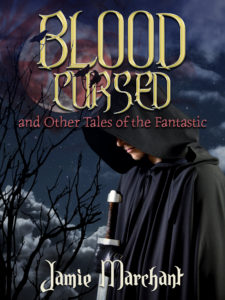 Blood Cursed and Other Tales of the Fantastic has a shining new cover
Blood Cursed and Other Tales of the Fantastic has a shining new cover